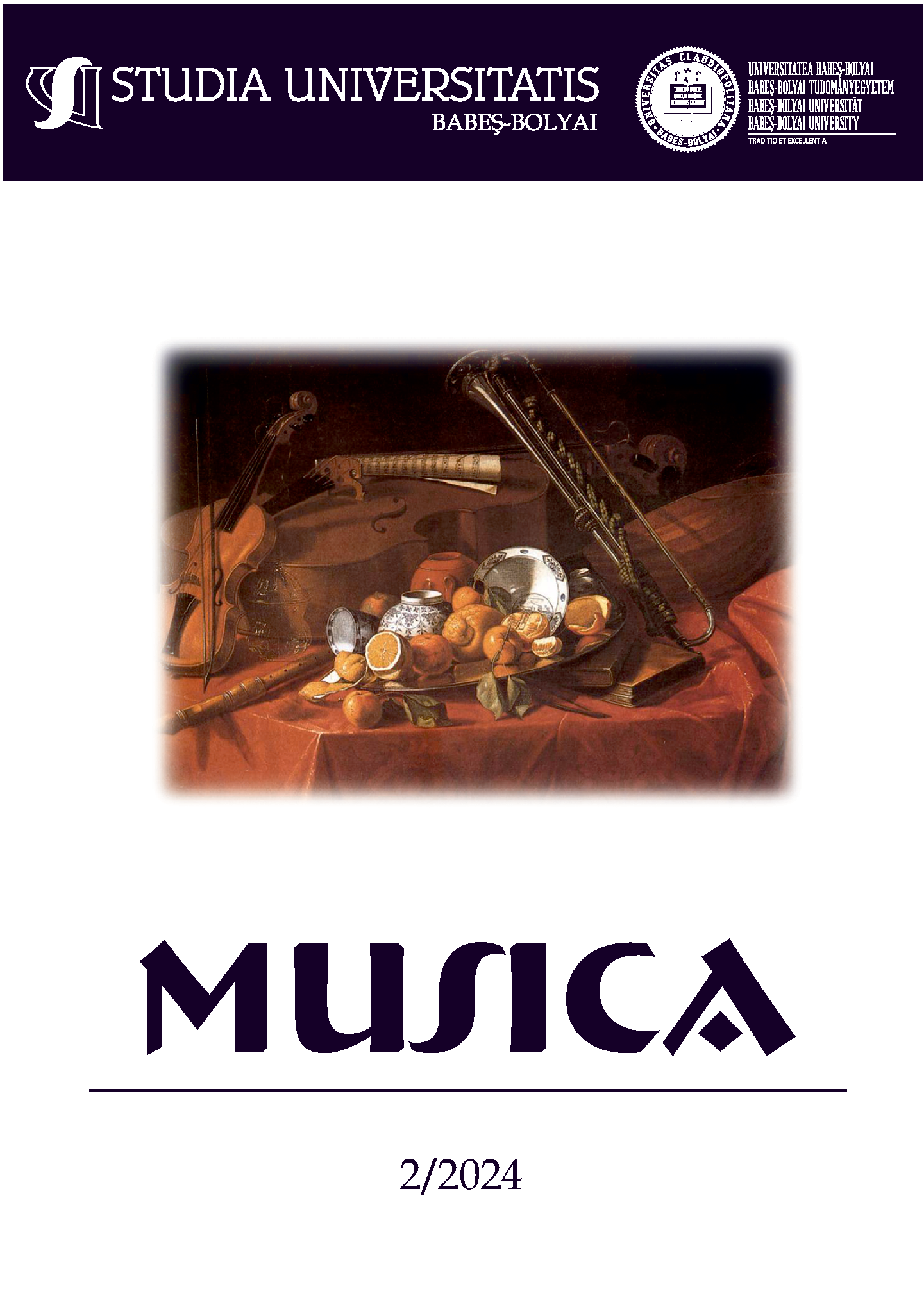Overture "Shéhérazade" by Maurice Ravel: Genre and Semantic Projections
DOI:
https://doi.org/10.24193/subbmusica.2024.2.14Keywords:
Maurice Ravel, Shéhérazade, overture de féerie, genre innovation, semantic projection, OrientalismAbstract
The article is devoted to the study of the genre specificity of M. Ravel's overture de féerie "Shéhérazade" (1898) and the identification of its important semantic aspects. The non-traditional genre definition of the composition as an overture de féerie reveals the composer's desire to actualize the theatrical context known to the listener (the féerie genre). The composer seems to extend the “exotic” semantic layer, given in the title by the name of the heroine of the Arabian tales “One Thousand and One Nights”, to the “stereophonic” space of the féerie, and the orchestra completely takes over all the functions of creating the physical and metaphysical dimensions of the féerie. The multidimensionality of the national theatrical genre of the féerie is “folded” in the "Shéhérazade" overture into an orchestral space that contains multilevel projections of the unfolding of extra-musical meanings. This is how the connections between the first orchestral composition and the compositions of the following years - “Waltz” (“choreographic poem”) and “Bolero” (“ballet for orchestra”) – are revealed. The unity of plastic and sound gestures, sensual and deeply hidden from thoughts fantasies will remain a distinctive characteristic of Maurice Ravel's thinking until his last compositions.
References
Bartlet, M., Elizabeth, C. Opéra féerie. Grove Music Online: website. Link: https://doi.org/10.1093/gmo/9781561592630.article.18674
Fauré, G. Lettre à Ernest Chaisson № 7 de 20.05.1899. Maurice Ravel. L'intégrale – Correspondance (1895–1937) écrits et entretiens. Sous la direction de Manuel Cornejo. Paris : Le Passeur, P.68.
d’Indy, Vincent. Lettre à Maurice Ravel № 5 de 29.04.1899. Maurice Ravel. L'intégrale – Correspondance (1895–1937) écrits et entretiens. Sous la direction de Manuel Cornejo. Paris : Le Passeur, P.67.
d’Indy, Vincent. Lettre à Maurice Ravel № 6 de 8 ou 15.05.1899. Maurice Ravel. L'intégrale – Correspondance (1895–1937) écrits et entretiens. Sous la direction de Manuel Cornejo. Paris : Le Passeur, P.67.
Gorceix, Paul. De La Princesse Maleine à La Princesse Isabelle. Essai sur le théâtre de Maeterlinck. Maurice Maeterlinck, Œuvres II : théâtre I, Bruxelles, Complexe, 1999.
Jankelevitch, V. Ravel. Paris: Seuil.1994.
Kaminsky, Peter. Unmasking Ravel: New Perspectives on the Music. University Rochester Press, 2011.
Marnat, M. Maurice Ravel. Paris: Fayard,1995.
Ravel, M. Lettre à Florent Schmitt № 9 de 9.06.1899. Maurice Ravel. L'intégrale – Correspondance (1895–1937) écrits et entretiens. Sous la direction de Manuel Cornejo. Paris : Le Passeur, pp. 68-69.
Ravel, M. Mes souvenirs d’enfant paresseux. Maurice Ravel. L'intégrale – Correspondance (1895–1937) écrits et entretiens. Sous la direction de Manuel Cornejo. Paris : Le Passeur, pp. 1443-1449.
Ravel Maurice. Esquisse autobiographique. Maurice Ravel. L'intégrale – Correspondance (1895–1937) écrits et entretiens. Sous la direction de Manuel Cornejo. Paris : Le Passeur, pp.1437-1441.
Ravel. Souvenirs de Manuel Rosenthal / recueillis par Marcel Marnat. Paris : Hazan, 1995. 206 p.
Roger, Nichols. Ravel. New Haven : Yale University Press, 2011.
Sironval Margaret. L’image de Shéhérazade dans les éditions anglaises des Mille et Une Nuits au xixe siècle. In : Rêver d’Orient, connaître l’Orient : Visions de l’Orient dans l’art et la littérature britanniques [en ligne]. Lyon : ENS Éditions, 2008.
Vandenborre, Katia. Analyse comparative de la féerie chez Maeterlinck et Wyspiański. La Noce face au premier théâtre de Maeterlinck, TRANS- [En línea], 8/ 2009. Link: http://journals.openedition.org/trans/348 (accessed: 24.04.2024).
Downloads
Published
How to Cite
Issue
Section
License
Copyright (c) 2024 Studia Universitatis Babeș-Bolyai Musica

This work is licensed under a Creative Commons Attribution-NonCommercial-NoDerivatives 4.0 International License.



